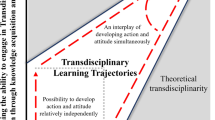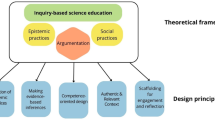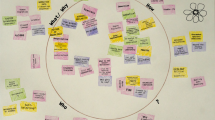Abstract
Epistemic agency is a conceptual tool for creating effective teaching methods that involve students taking accountability for their own learning and aligns with the broader emphasis on agency in modern education. However, there is a challenge in balancing this approach with the need to cover traditional physics content within the limited timeframe of the academic year. To ensure success, carefully designed courses are needed and the potential of digital technologies holds promise in this regard. This Perspective discusses the importance of fostering epistemic agency among Generation Z students — digital natives — in the context of physics education. It explores innovative teaching approaches that empower students to take initiative in their learning. These approaches leverage digital technologies to handle complex data and address authentic (real life, complex) problems, ultimately enhancing students’ epistemic agency.
This is a preview of subscription content, access via your institution
Access options
Access Nature and 54 other Nature Portfolio journals
Get Nature+, our best-value online-access subscription
$29.99 / 30 days
cancel any time
Subscribe to this journal
Receive 12 print issues and online access
$209.00 per year
only $17.42 per issue
Buy this article
- Purchase on Springer Link
- Instant access to full article PDF
Prices may be subject to local taxes which are calculated during checkout




Similar content being viewed by others
References
Seemiller, C. & Grace, M. Generation Z: educating and engaging the next generation of students. About Campus 22, 21–26 (2017).
Selwyn, N. The digital native—myth and reality. Aslib Proc. New Inf. Perspect. 61, 364–379 (2009).
Collins, A. & Halverson, R. Rethinking Education in the Age of Technology: the Digital Revolution and the Schools in America 2nd edn (Teachers College Press, 2018).
OECD The OECD Learning Compass 2030. OECD Future of Education and Skills 2030 https://www.oecd.org/education/2030-project/teaching-and-learning/learning/ (2019).
Bennett, S., Maton, K. & Kervin, L. The ‘digital natives’ debate: a critical review of the evidence. Br. J. Educ. Technol. 39, 775–786 (2008).
Prensky, M. Digital natives, digital immigrants part 1. On Horizon 9, 1–6 (2001).
Jones, C., Ramanau, R., Cross, S. & Healing, G. Net generation or digital natives: is there a distinct new generation entering university? Comput. Educ. 54, 722–732 (2010).
Kennedy, G., Judd, T., Dalgarno, B. & Waycott, J. Beyond natives and immigrants: exploring types of net generation students. J. Comput. Assist. Learn. 26, 332–343 (2010).
Thompson, P. The digital natives as learners: technology use patterns and approaches to learning. Comput. Educ. 65, 12–33 (2013).
Bennett, S. & Maton, K. Beyond the ‘digital natives’ debate: towards a more nuanced understanding of students’ technology experiences. J. Comput. Assist. Learn. 26, 321–331 (2010).
Brown, C. & Czerniewicz, L. Debunking the ‘digital native’: beyond digital apartheid, towards digital democracy. J. Comput. Assist. Learn. 26, 357–369 (2010).
Jones, C. & Healing, G. Net generation students: agency and choice and the new technologies. J. Comput. Assist. Learn. 26, 344–356 (2010).
Warschauer, M. & Matuchniak, T. New technology and digital worlds: analyzing evidence of equity in access, use, and outcomes. Rev. Res. Educ. 34, 179–225 (2010).
Evans, C. & Robertson, W. The four phases of the digital natives debate. Hum. Behav. Emerg. Technol. 2, 269–277 (2020).
Helsper, E. J. & Eynon, R. Digital natives: where is the evidence? Br. Educ. Res. J. 36, 503–520 (2010).
Bandura, A. Social cognitive theory: an agentic perspective. Annu. Rev. Psychol. 52, 1–26 (2001).
Elgin, C. Z. Epistemic agency. Theory Res. Educ. 11, 135–152 (2013).
Vygotsky, L. S. Mind in Society: the Development of the Higher Psychological Processes (Harvard Univ. Press, 1978).
Vygotsky, L. S. Thought and Language (MIT Press, 1986/2012).
Prensky, M. Digital natives, digital immigrants part 2: Do they really think differently? On Horizon 9, 1–6 (2001).
Engle, R. A. & Conant, F. R. Guiding principles for fostering productive disciplinary engagement: explaining an emergent argument in a community of learners classroom. Cogn. Instr. 20, 399–483 (2002).
Odden, T. O. B., Silvia, D. W. & Malthe-Sørenssen, A. Using computational essays to foster disciplinary epistemic agency in undergraduate science. J. Res. Sci. Teach. 60, 937–977 (2023).
Philip, T. M. & Garcia, A. D. The importance of still teaching the iGeneration: new technologies and the centrality of pedagogy. Harv. Educ. Rev. 83, 300–319 (2013).
Sutton, R. M. Demonstration Experiments in Physics (McGraw-Hill, 1938).
Sharma, M. D., et al. Use of interactive lecture demonstrations: a ten year study. Phys. Rev. Spec. Top. Phys. Educ. Res. 6, 020119 (2010).
Sokoloff, D. R. & Thornton, R. K. Interactive Lecture Demonstrations: Active Learning in Introductory Physics (Wiley, 2004).
White, R., & Gunstone, R. Probing Understanding (Falmer, 1992).
Kang, N.-H. & Wallace, C. S. Secondary science teachers’ use of laboratory activities: linking epistemological beliefs, goals, and practices. Sci. Educ. 89, 140–165 (2005).
National Research Council America’s Lab Report: Investigations in High School Science (National Academies Press, 2005).
Wallace, C. S. & Kang, N.-H. An investigation of experienced secondary science teachers’ beliefs about inquiry: an examination of competing belief sets. J. Res. Sci. Teach. 41, 936–960 (2004).
Etkina, E., van Heuvelen, A., Brookes, D. T. & Mills, D. Role of experiments in physics instruction—a process approach. Phys. Teach. 40, 351–355 (2002).
Holmes, N. G. & Wieman, C. E. Introductory physics labs: we can do better. Phys. Today 71, 38–45 (2018).
Holmes, N. G. & Bonn, D. A. Quantitative comparisons to promote inquiry in the introductory physics lab. Phys. Teach. 53, 352–355 (2015).
Wieman, C. Comparative cognitive task analyses of experimental science and instructional laboratory courses. Phys. Teach. 53, 349–351 (2015).
Irving, P. W., Obsniuk, M. J. & Caballero, M. D. P3: a practice focused learning environment. Eur. J. Phys. 38, 055701 (2017).
Irving, P. W., McPadden, D. & Caballero, M. D. Communities of practice as a curriculum design theory in an introductory physics class for engineers. Phys. Rev. Phys. Educ. Res. 16, 020143 (2020).
Author information
Authors and Affiliations
Corresponding author
Ethics declarations
Competing interests
The author declares no competing interests.
Peer review
Peer review information
Nature Physics thanks the anonymous reviewer(s) for their contribution to the peer review of this work.
Additional information
Publisher’s note Springer Nature remains neutral with regard to jurisdictional claims in published maps and institutional affiliations.
Rights and permissions
Springer Nature or its licensor (e.g. a society or other partner) holds exclusive rights to this article under a publishing agreement with the author(s) or other rightsholder(s); author self-archiving of the accepted manuscript version of this article is solely governed by the terms of such publishing agreement and applicable law.
About this article
Cite this article
Kang, NH. Epistemic agency as a critical mediator of physics learning. Nat. Phys. 20, 362–366 (2024). https://doi.org/10.1038/s41567-024-02399-y
Received:
Accepted:
Published:
Issue Date:
DOI: https://doi.org/10.1038/s41567-024-02399-y



